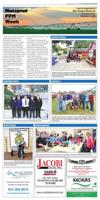Meals are available weekdays at 11:30 a.m. at the Joe Rhoads Senior Center, located at 123 S. Mulberry St. in Corydon, for those 60 and older or disabled.
The 2023-24 boys’ basketball season saw a mixed bag of results for Harrison County, with a couple of teams showing considerable improvement while others saw down years.
David K. Bickel, 69, Corydon, Ind., passed away Tuesday, April 16, 2024, in New Albany, Ind.
Anthony Michael Melton, was born March 31, 1991, in Milwaukee, Wis.
Philip A. Babcock, 66, of Depauw, Ind., died on Thursday, April 18, 2024, at his residence.
Death Notices
James L. (Jim) Kusek, a lifelong resident of Corydon, passed away peacefully Tuesday, March 12, 2024, of heart failure.
Lois Edna Bevins Endris, age 92, of Depauw, Ind., passed away on Tuesday, April 9, 2024, surrounded by the love of her family.
To submit an item to the Live Wire, call 812-738-2211 and select option 5. We ask that calls be less than one minute. All comments will be reviewed and those meeting our criteria will be published in the Live Wire column. Libelous comments, rumors, personal attacks and political endorsements…



















Commented
Sorry, there are no recent results for popular commented articles.